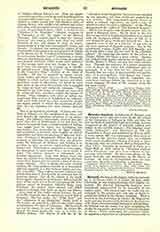

Ricardus Anglicus, Archdeacon of Bologna, was an English priest who was rector of the law school at the University of Bologna in 1226, and who, by new methods of explaining legal proceedings, became recognized as the pioneer of scientific judicial procedure in the twelfth century. His long-lost work “Ordo Judiciarius” was discovered in MS. by Wunderlich in Douai and published by Witt in 1851. A more correct MS. was subsequently discovered at Brussels by Sir Travers Twiss, who, on evidence which seems insufficient, followed Panciroli in identifying him with the celebrated Bishop Richard Poor (died 1237). Probably he graduated in Paris, as a Papal Bull of 1218 refers to “Ricardus Anglicus doctor Parisiensis”, but there is no evidence to connect him with Oxford. He also wrote glosses on the papal decretals, and distinctions on the Decree of Gratian. He must be distinguished from his contemporary, Ricardus Anglicanus a physician.
EDWIN BURTON

